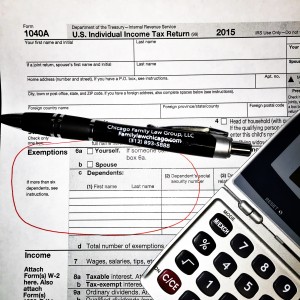It’s that time of year, again: time to file your taxes. Are you looking to get as much of a refund back as possible? One of the most desirable exemptions is the dependency exemption. Parents are entitled to a dependency exemption for each child they support. However, if you are divorced or filing separately from the other parent, only one parent can use the exemption. (See IRS Publication 504 Divorced or Separated Individuals for use in preparing 2015 Tax Returns.)
 IRS RULES
IRS RULES
General Rule – The custodial parent gets the entire dependency exemption.
A dependent is either:
- Your child or a relative,
- Who meets a set of tests.
The IRS defines a custodial parent as:
- The parent with whom the child lived for a greater number of nights in 2015; or
- If the child was with each parent for an equal number of nights, the custodial parent is the parent with the higher adjusted gross income. (See IRS Publication 503 Child and Dependent Care Expenses.
COURT-ORDERED DEPENDENCY EXEMPTION
Sometimes it makes sense to allow the noncustodial parent to claim the exemption. For example, if the custodial parent is unemployed or makes little income, it would make sense to allow the non-custodial parent to use the dependency exemption to get a bigger tax return.
Parents can agree between themselves who gets the exemption, or the court can order who gets the dependency exemption each year. It is common for divorced or separated parents to negotiate who can take the exemption. If there are two children, each parent might claim one dependent. If there is one child, the parents might alternate the exemption. If the non-custodial parent does not contribute at least 50% to the dependent’s expenses, it is less likely that the non-custodial parent will get the exemption. If there is a child support arrearage, it is also common to not allow the exemption.
COURT ORDERS vs. IRS
Although a court order allowing the non-custodial parent to take the exemption is enforceable through the state court, it has no bearing on the IRS. The custodial parent needs to release the exemption by signing an IRS Form 8332 Release/Revocation of Release of Claim to Exemption for Child by Custodial Parent or a similar statement. The custodial parent becomes the “non-custodial parent” for tax purposes and cannot claim the exemption that year. The noncustodial parent becomes the “custodial parent” for tax purposes and must attach Form 8332 or the statement to his or her return.
If the noncustodial parent has a child support arrearage at the end of the year, the custodial parent can revoke the Form 8332 release with the IRS. Whether that is allowed by the court depends on your court order. The custodial parent can use Part III of Form 8332 for this purpose and must attach a copy of the revocation to his or her return for each tax year he or she claims the child as a dependent as a result of the revocation. The custodial parent must also give (or make reasonable efforts to give) written notice of the revocation to the noncustodial parent.
NEED HELP?
Did you finalize your divorce or parenting judgment and neglect to cover who gets to claim the dependency exemption? Has there been a substantial change in circumstances that might entitle you to claim the dependency exemption? Were you entitled to claim the dependency exemption but the other parent claimed it?